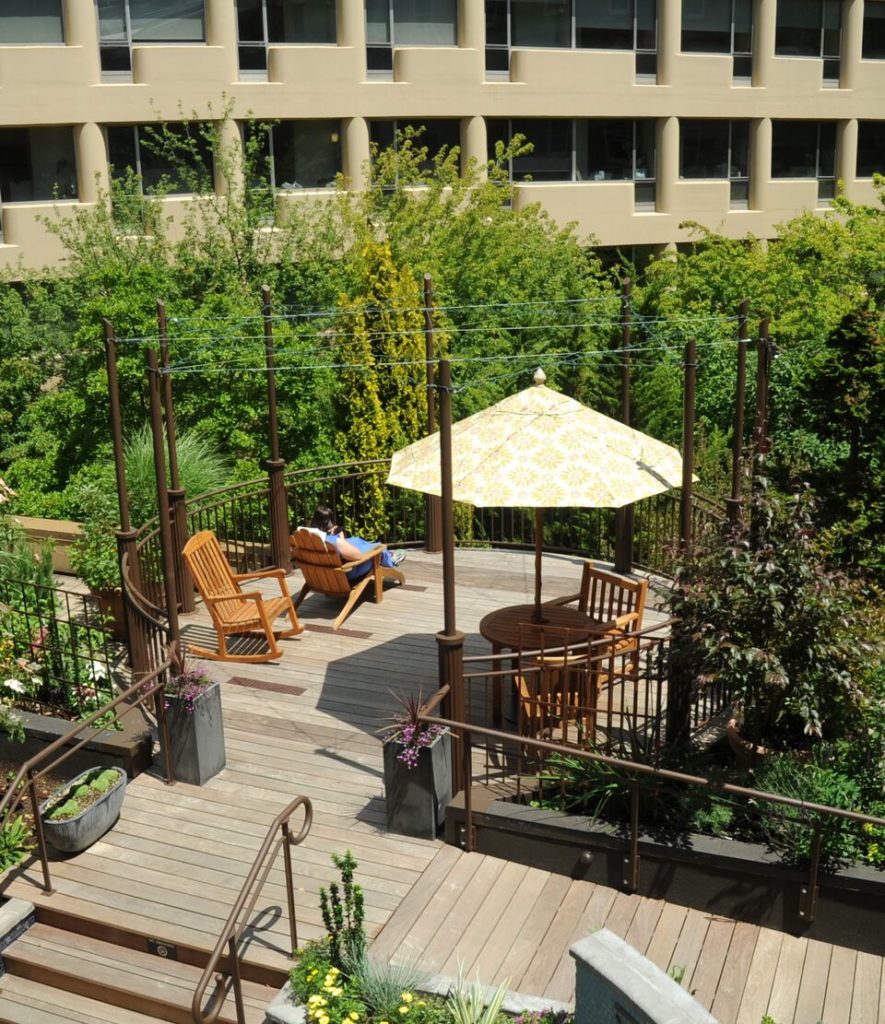Innovative hospitals are responding to a growing desire for less medicalized births.

In hospital settings, stress is inherent among patients, families and healthcare professionals. More than forty years of research and several recent studies of patient groups have found that viewing nature can produce rapid and substantial psychological and physiological recovery from stress and anxiety (Marcus and Sachs, 2014).
The Terrace Garden at Legacy Emanuel Medical Center in Portland, Oregon provides the Family Birth Center and Cardiovascular Intensive Care unit community a restorative place that nourishes their psychological, physical and spiritual needs.
In addition to the healing opportunities, an interdisciplinary research project documents the role of a garden in a health care setting for expectant mothers and their support system. The Nature Place research team designed a clinical trial to measure neonatal outcomes related to pain, anxiety and stress. Would the newly constructed Terrace Garden provide a welcome respite from stress and confinement? Results indicate mothers and their partners’ use of the Terrace Garden prior to hospital discharge provides benefit, but it was not quite how the researchers anticipated.
The postpartum study is recently featured in a hopeful editorial in the Journal of Perinatal and Neonatal Nursing. Team leaders Roger Ulrich, PhD and Serene Perkins, MD share why their project revealed unexpected outcomes, and what they learned along the way.
The team discovered a robust clinical trial would not be possible because too few participants were available for statistical comparison. In an intriguing discovery, most mothers did not want to risk being part of the control group because it meant they would not be allowed to access the garden. Additionally, some mothers who had agreed to participate ultimately arrived at the hospital with little time to use the garden prior to delivery. Mothers had a strong positive impression of how the garden access could benefit them, and a strong desire for a calm retreat. They did not want to risk missing this opportunity.

The mothers who did visit the garden experienced benefit and those who did not get a chance to use the garden had a positive impression knowing it was at least available to themselves and others. Researchers also discovered partners, daughters, grandmothers and other family members used the garden to take a break.
A garden for patients, families, visitors and staff allows everyone an opportunity for health and wellbeing.
In a healthcare setting, a garden can provide respite and restoration, but the location and ease of access may need to be readjusted for special populations like expectant mothers.
“One of the most profound pieces of my work is knowing that spending time in a garden has the potential to help employees, community members, and patients improve without them even knowing they are improving (Research shows our mood and physiological health markers can improve even if we are not seeking improvement). When families visit their loved ones and are so stressed, they don’t even have to know why the garden is there to benefit. It can help with their coping.”- Teresia Hazen, MEd, HTR, GMHP, Coordinator of the Legacy Health Therapeutic Garden Program

